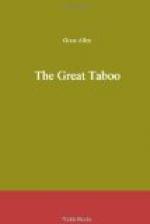The Frenchman smiled a gallant smile. “Unhappily, mademoiselle,” he said, “though, as a medical student, I took up to a certain extent biological science in general at the College de France, I never paid any special or peculiar attention in Paris to birds in particular. But it is the universal opinion of the natives (if that counts for much) that parrots live to a very great age; and this one old parrot of mine, whom I call Methuselah on account of his advanced years, is considered by them all to be a perfect patriarch. In effect, when the oldest men now living on the island were little boys, they tell me that Methuselah was already a venerable and much-venerated parrot. He must certainly have outlived all the rest of his race by at least the best part of three-quarters of a century. For the islanders themselves not infrequently live, by unanimous consent, to be over a hundred.”
“I remember to have read somewhere,” Felix said, turning it over in his mind, “that when Humboldt was travelling in the wilds of South America he found one very old parrot in an Indian village, which, the Indians assured him, spoke the language of an extinct tribe, incomprehensible then by any living person. If I recollect aright, Humboldt believed that particular bird must have lived to be nearly a hundred and fifty.”
“That is so, monsieur,” the Frenchman answered. “I remember the case well, and have often recalled it. I recollect our professor mentioning it one day in the course of his lectures. And I have always mentally coupled that parrot of Humboldt’s with my own old friend and subject, Methuselah. However, that only impresses upon one more fully the folly of hoping that we can learn anything worth knowing from him. I have heard him recite his story many times over, though now he repeats it less frequently than he used formerly to do; and I feel convinced it is couched in some unknown and, no doubt, forgotten language. It is a much more guttural and unpleasant tongue than any of the soft dialects now spoken in Polynesia. It belonged, I am convinced, to that yet earlier and more savage race which the Polynesians must have displaced; and as such it is now, I feel certain, practically irrecoverable.”
“If they were more savage than the Polynesians,” Muriel said, with a profound sigh, “I’m sorry for anybody who fell into their clutches.”
“But what would not many philologists at home in England give,” Felix murmured, philosophically, “for a transcript of the words that parrot can speak—perhaps a last relic of the very earliest and most primitive form of human language!”
At the very moment when these things were passing under the wattled roof of Muriel’s hut, it happened that on the taboo-space outside, Toko, the Shadow, stood talking for a moment with Ula, the fourteenth wife of the great Tu-Kila-Kila.
“I never see you now, Toko,” the beautiful Polynesian said, leaning almost across the white line of coral-sand which she dared not transgress. “Times are dull at the temple since you came to be Shadow to the white-faced stranger.”




